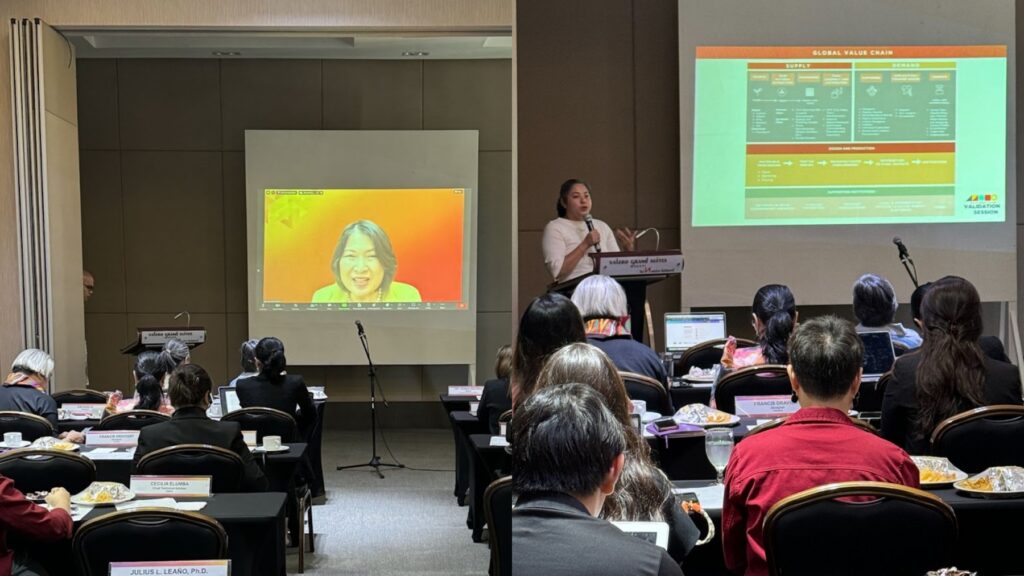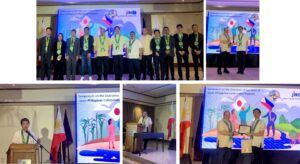
The Department of Trade and Industry (DTI), through its Bureau of Industry Planning and Innovation (BIPI), conducted a validation session for the results of its fashion and textile industries roadmap project on 16 April at Valero Grand Suites, Makati City.
As part of BIPI’s Creative C.H.A.T.S. (Collaborative Huddles and Townhall Sessions) Series, the validation session gathers industry leaders, experts, and stakeholders to assess the results of the roadmap and allows the public to share their insights on the strategies and plans emanating from the road mapping exercise.
The roadmap aims to evaluate the past performance and present conditions of the Philippine and global fashion and textile industries, and pinpoint the impediments and obstacles hindering its advancement. It highlights the key strategies fashioned under D.R.E.A.M Pillars: (1) develop the capacity of artisans and designers, (2) raw material investment, (3) establish enabling policies and infrastructure support, (4) archiving and documentation, and (5) market stimulus and expansion.

DTI-Competitiveness and Innovation Group Undersecretary Rafaelita M. Aldaba emphasized how global configurations and trade liberalization have presented both challenges and opportunities, driving the Philippine fashion and textile industries towards innovation and global competitiveness. Emphasizing the shift towards high-value and eco-friendly textiles, she noted the current policies and strategies from the national government are enhancing industry competitiveness, promoting innovation, and strengthening the local supply chain.
“The prospects for the growth and development in the Philippines are promising because of our diverse cultural heritage, skilled labor force, and the support of government initiatives that assist local designers, develop sustainable practices, and enhance the competitiveness of PH textiles in the local market,” Usec. Aldaba added.
During the open forum, in-person and virtual participants agreed to provide more focus on enhancing the sourcing of raw materials, building capacity among creative industry players in the fashion and textile industries, reinforcing the need for cultural heritage documentation, expanding reach to global markets, investing in modern infrastructure, and developing enabling policies to improve the business climate, among other things.
“Throughout our sessions today, it has become abundantly clear that the challenges facing the Philippine fashion and textiles industries are multifaceted and complex. Yet, equally evident is the tremendous potential that exists within these sectors to drive inclusive growth, foster innovation, and promote cultural exchange on a global scale,” DTI-BIPI Director Lilian Salonga concluded.
The Creative Industries Roadmap Project is one of the initiatives under the DTI’s Malikhaing Pinoy Program aimed at supporting its evidence-based policy-making efforts and industry-driven program development exercises geared towards strengthening the country’s creative industries as mandated in the Philippine Creative Industries Development Act or Republic Act No. 11904.
Among the validation session attendees include Deputy Director-General Ann Claire Cabochan of Intellectual Property of the Philippines, Ms. Celia Elumba of United Nations Industrial Development Organization, Ms. Carissa Cruz-Evangelista and Ms. Esme Palaganas of the Philippine Fashion Coalition, Ms. Emi Englis of Davao Fashion and Design Council Foundation, Inc., Ms. Leny Castillo of Great Gifts, Ms. Nurainie Ampatuan of Hilyah Signorina Fashion Brand, Ms. Christina Gaston of Hacienda Crafts, Ms. Kae Batiquin of Holistic Coalition of the Willing, Mr. Francis Dravigny of Interlace, and Ms. Carla Mae Leonor of Design Center of the Philippines.
Also present were representatives from the Department of Science and Technology-Philippine Textile Research Institute, Department of Tourism, Center for International Trade Expositions and Missions, Philippine Trade and Investment–Tokyo, Fashion Revolution Philippines, De La Salle – College of St. Benilde, and DTI’s regional offices.


